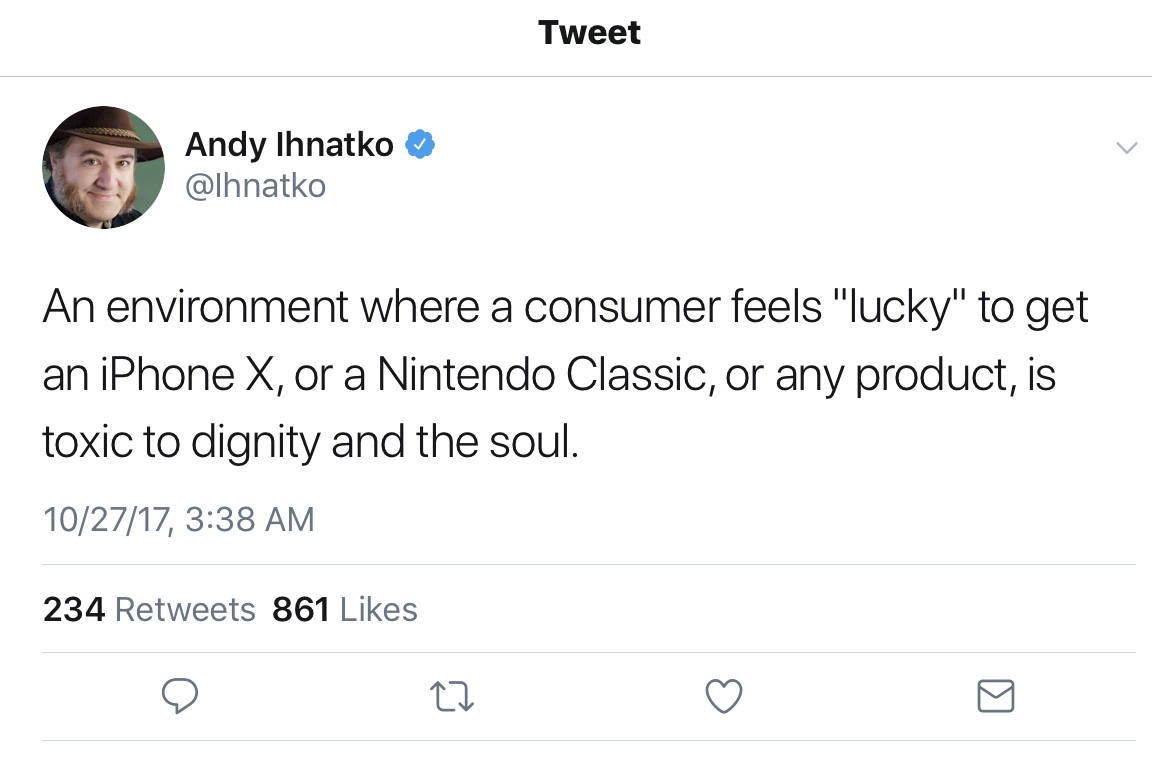Andy Ihnatko’s recent comment about the release of the iPhone X is a great example in the potential held within a Tweet.
There is little to disagree with here. Everyone would and should have their soul’s dignity respected and held sacrosanct, whether it is by others or by ourselves. But his statement has an edge to it — one that cut many, myself included. Based on the 126 and counting responses to the Tweet and/or replies, I was not alone.
Yes, I felt lucky that I got an early date on my upgrade to the iPhone X (Being sick, I slept through the 3 AM Eastern launch time.). But I have had to wait for technology upgrades before and did so with a shrug. I considered responding to the tweet in order to make the distinction between the sense of feeling lucky to get an early date and the kind of toxic need to be a first-day adopter.
Then, I saw the outrage from those who took great umbrage to a statement that safely true.
I won’t get into the details of the responses (You can read them for yourself, if you wish.) as I don’t feel comfortable speaking for others in regard to what they felt and why they felt it. Their outrage, however, triggered a need in me to confront my own response. While I don’t think my relationship with technology is toxic (I can stop any time. Really.), my need to justify myself to someone who does not know me from Adam certainly signals something — something more than acknowledging the false intimacy that social media can sometimes breed. And while my wife’s occasional jokes about my relationship to my iDevices being a little to close to Gollum’s to the One Ring might be overstating it a bit, the cutting edge is still there.
Ultimately, I do think that the technological revolution offered by these devices is more democratizing and liberating than they are binding. I am able to stay in closer touch with people I know on multiple continents than I would have at any time in the past. Yes, it is true that, in centuries past, there were great letter writers who had such correspondences — ones that were much more intimate than seeing a picture float past on a social media platform, but those people tended to have access to servants to handle things like getting dinner ready. Now, such connections are available to anyone who can afford the technology and the fees required to connect to the internet[1].
No, I am more concerned about our collective reactions to the koanic nature of Twitter and, to a lesser degree, other social media outlets. Koans are difficult and knotty things designed to make one reflect deeply on the nature of self and one’s relationships to the universe. While I don’t think most tweets rise to the level of koans, they do touch a similar nerve in us. It is our reaction to them that is telling.
Ihnatko’s statement is not a judgement of any individual and he has repeatedly said that there is nothing wrong with wanting an iPhone X and taking pleasure in getting one. That did not stop me (and others) trying to justify their feeling of good fortune at getting it sooner rather than later and cause others to insult and demean him.
I would submit that this tells us a great deal more about those of us responding (Let’s face it: The fact that I am writing this means that I am responding at much more length than those on Twitter.) than it does about Ihnatko or the iPhone X.
This soul-searching is probably more than a little necessary. The technological revolution we are experiencing will likely be looked back on 500 years from now as a Renaissance that dragged us out of a kind of Dark Age that began sometime around 1914[2], if not before. It is changing the world as significantly as the introduction of movable type to the West in the mid-1400s and it is doing so more quickly. We need, as individuals and as a society, to puzzle out how we will relate to these devices, given how intimate these relationships have become.
[1] These costs may not be trivial, but they are less expensive than maintaining an aristocratic lifestyle.
[2] Another potential date would be 1789. In cases like this, however, it is best to leave it to the future. They will have a much better perspective on things.
Dr. Matthew M. DeForrest is a Professor of English and the Mott University Professor at Johnson C. Smith University. The observations and opinions he expresses here are his own. You are very welcome to follow him on Twitter and can find his academic profile at Academia.edu.
